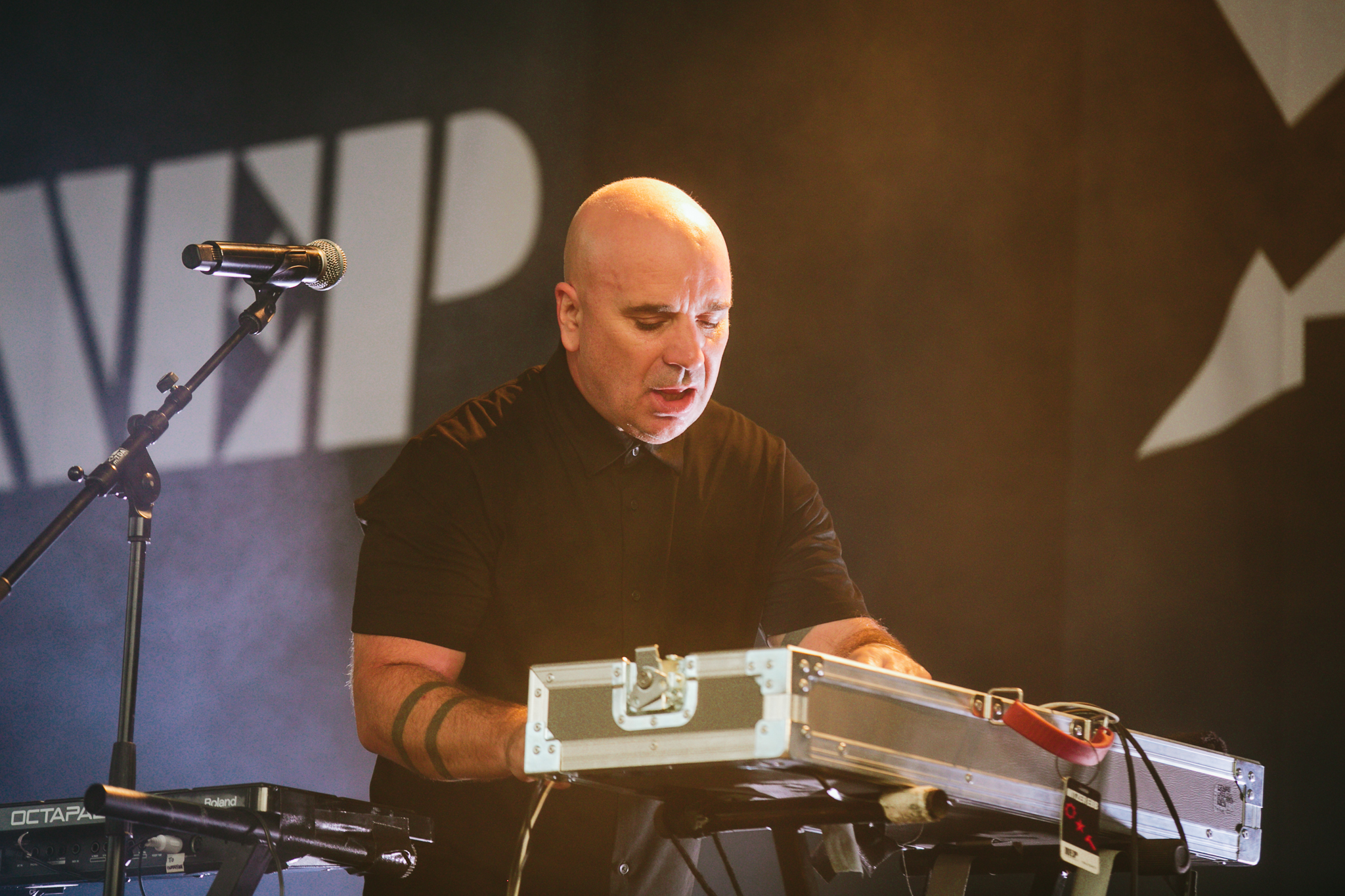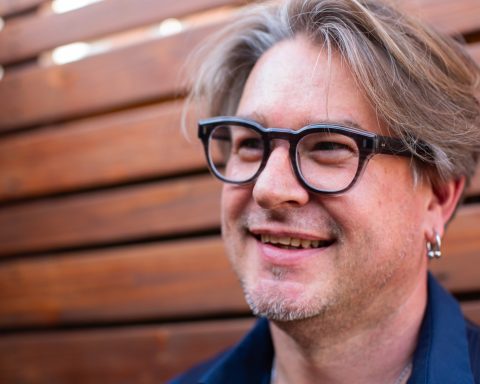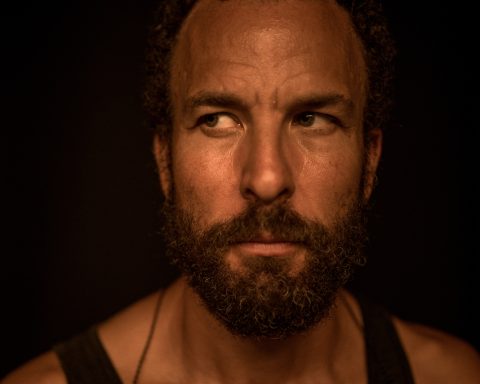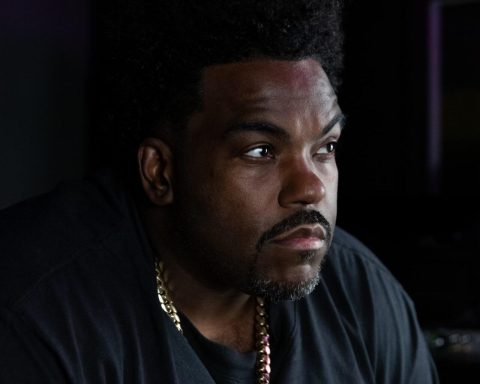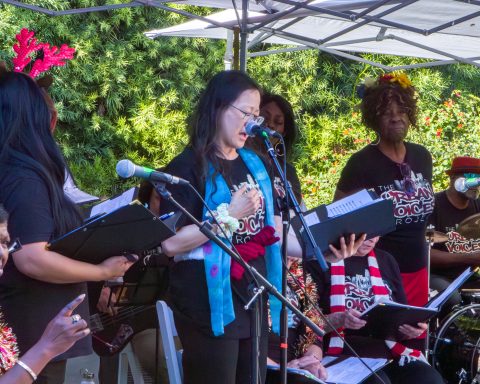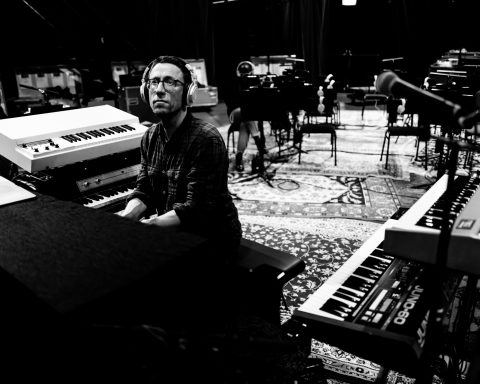If Bon Harris’ only contribution to music was Nitzer Ebb’s pioneering discography, that alone would cement his legendary status. Yet Harris’ career also includes collaborations with everyone from Billy Corgan and Marilyn Manson to Avril Lavigne and Andrew Poppy. He’s also earned plum scoring gigs and a reputation as tech authority.
Harris took the time to speak with us from his home in Eagle Rock, CA. In a rich Essex accent and with his detailed, analytical memory, he walks us through the Nitzer Ebb story, outside projects, and how the SYSTEM-100 changed his musical trajectory.
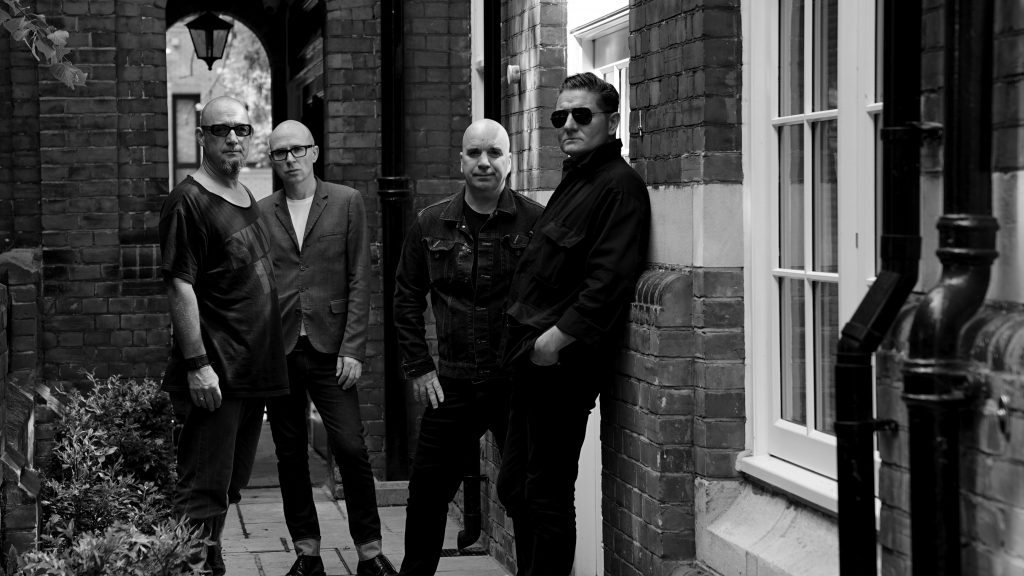
What was Essex like as a place for a budding electronic musician to grow up?
Well, at that time, in the late ’70s, early ’80s, it was kind of a very rural place. It was a lot like London overspill. I lived in a little village outside Chelmsford, which is the capital town of Essex. It was very much like living in the country, so there wasn’t much to do. There weren’t many places to go and there were very conservative attitudes, even within the musicians’ circles. You know, synthesizers were still something new.
You’ve mentioned that acts like Siouxsie and the Banshees, Killing Joke, and Bauhaus influenced you. What were some other pivotal inspirations?
If you go back to the earliest acts that planted the seeds in my mind for what we now call alternate music, it would have to be Bolan and Bowie. I don’t know how old I was when I first heard those two—probably six or seven years old. The music was different and a bit more raucous. Plus, they had the flamboyant dress code and the makeup. We were just fascinated as kids.
Then there was always a subculture in England before punk rock came along. The outcast and rebel music for us was reggae. There was a lot of reggae stuff, aspects of glam rock, and the second wave of skateboarding in the 1970s. Devo was a bold band that made me aware of synthesizers and cool stuff. It all came together in 1976 with punk rock.
How did Nitzer Ebb form?
We all met first year in high school, so we were like eleven, twelve years old. There was a shared love of skateboarding, Devo, and new wave music. As music became more serious, our active involvement in skateboarding became less.
At that point, it was the first wave post-punk synth stuff. Everyone was kind of perennially aware of Kraftwerk, and you had the whole scene they helped to spawn, plus Depeche Mode, and the New Romantic thing. That wave of bands pushed the button for me. They made me realize I wanted to make music.
Nitzer Ebb self-released Warsaw Ghetto, Warsaw Ghetto Remixes, and Let Your Body Learn. Was that out of necessity, and what did the band learn from that experience that it brought to Mute when you finally signed?
We tried to get people interested. And no one was buying it. We even have a rejection letter from Mute somewhere in the early days. I think the main thing that we took with us—much to Daniel Miller’s chagrin—was fierce independence. There were times we exasperated him, as he asked us to do things that were for our benefit, marketing-wise.
We were young kids who mistrusted anything we suspected was a sellout or an attempt to get us to undermine our artistic principles. Looking back, sometimes we were right and kept our identity. But there’s no doubt we sometimes shot ourselves in the foot
The band worked with luminaries like Flood throughout its career. Are there lessons you learned from different producers that have shaped your style?
Our indie label teamed us up with producer, Phil Harding. He had done Dead or Alive, Rick Astley, and all those real mainstream hits. His discography is ridiculous. There’s very little he didn’t touch in terms of U.K. popular music.
Phil was extremely efficient. If you work in a certain style of music and that style requires certain things, don’t reinvent the wheel every time.
Flood, across the board, is one of the finest producers of his generation. Also, as a human being, his patience, wisdom, and everything else are exceptional. Everything else I know is out of luck in some way.
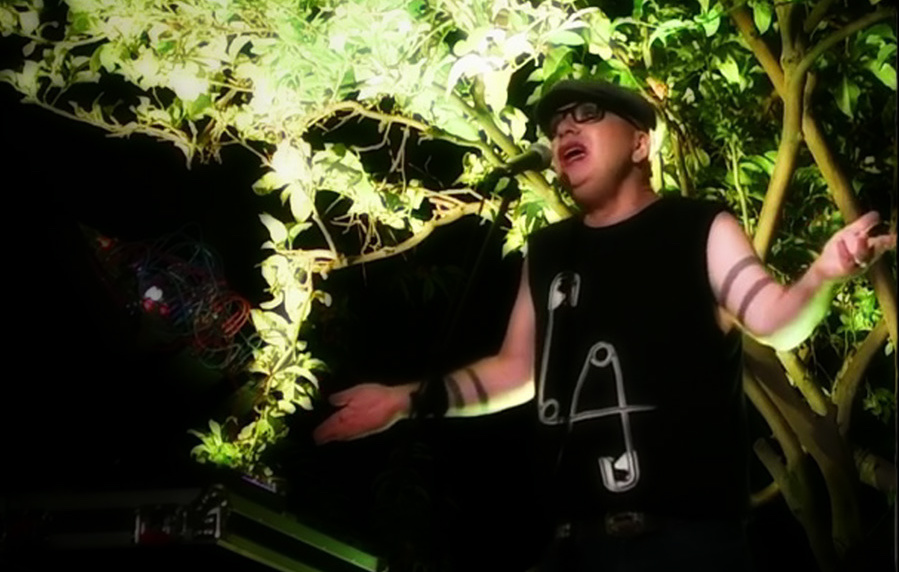
From the outside, it seemed as though there was always a kinship between Depeche Mode and Nitzer Ebb. Explain how that relationship began and how it evolved?
First of all, we’re all from Essex, so they were local heroes. They probably weren’t aware of us, as we were a little bit younger. We ended up signing with Mute and that kind of sealed the deal. That’s when we came on their radar.
They even took you on the Music for the Masses tour, an incredible opportunity in terms of exposure.
We met them before doing the Music for the Masses tour. They played a show at Wembley, and we went to meet them afterward. We were like peas in a pod. Depeche was five years older than Doug and I but had that same upbringing, same culture.
They were very kind to us. Back when they were doing Music for the Masses and Violator, labels could buy support slots. Depeche refused to do it. They would only take bands that they liked and wanted to endorse. Sometimes that meant taking lesser-known acts they believed in. They looked after us, make sure we had everything we wanted, and were very gracious.
The band traversed many different styles and scenes including “Industrial,” “Electronic Body Music,” and “Hard Beat.” Do any of those terms feel relevant when describing Nitzer Ebb?
Towards the end of the first album, we were seeking out the same music, because there wasn’t much of our niche yet. We were aware of the need to call it something, so these titles started appearing left and right. I suppose “Electronic Body Music” was a decent description. It was a bit of press, a bit of marketing, and a few people in the scene trying to find something to unify ourselves.
"It was a bit of press, a bit of marketing, and a few people in the scene trying to find something to unify ourselves."
How aware were you of the changes you saw happening in electronic music during the ’80s, like the Chicago House scene and various other subgenres?
There was a lot of cross-pollination. One of the best ways to get promotion for our own independent twelve-inches was to get DJs to play them. We sent records out and we’d hear, ‘I’m from Chicago, and I’m playing this stuff.’ People that would come up to me from the dance music scene in Detroit.
Fast-forward to the late-’90s. Tell us how the reunion came to be.
We went from being teenagers playing local clubs to touring massive stadiums with Depeche Mode. There were so many changes. Inevitably, that took its toll along the way. Bands begin to see things differently and you grow apart. It’s quite an intense experience when we work together. I think we had enough of it, and each other, so we didn’t do it for ages.
We established ourselves as part of an entity. You ask yourself, Who am I outside of this? Does this thing completely define me? I wanted to go and do stuff on my own for a while and see where I was at. But you can’t grow out of something like the Ebb that is such a part of both of us. At a certain point, your attitude mellows. You haven’t seen each other for ages, and you miss it.
"At a certain point, your attitude mellows. You haven't seen each other for ages, and you miss it."
What did it feel like to return to Nitzer Ebb material after a long break?
We’ve had a couple of hiatuses and reunions. This time, I was coming back in my 50s doing songs I did as an angry 20-year-old. I had to ask myself, Is this relevant? As a man approaching middle age, should I be performing these songs, or is it going to look silly?
Those questions are part of the process, too. I realized I had to own who I was.
What is the status of Nitzer Ebb today?
We get requests every year—festivals, etc.—and these requests have been growing. Last year, we hit our stride, and were about to start doing shows. This April, we were going to Europe and now everything’s shot. We very much consider ourselves active. As soon as we can, we’ll get back out there.
When Nitzer Ebb first started, we thought of ourselves as a little collective. There were five people, three of them musicians. The other members did graphic design and administration. Simon and David, who were original members, got back into music ten years ago, doing street-level club music which I liked.
"When Nitzer Ebb first started, we thought of ourselves as a little collective."
So, we invited two of our founding members back. We wanted to do it a little less hard-edged and a bit more of a club sort of thing. A bit less industrial and a bit more electronic. At this age, it’s nice to have everyone back, because we’ve all remained friends.
Nitzer Ebb has become such an influence on many bands, including the likes of Nine Inch Nails. Do you remember a certain moment that stands out as when you realized the impact of what the band?
There was a scene—that we were inadvertently part of—but it was there. We were aware of some general feeling of a groundswell. It didn’t surprise me there were offshoots from that. A direct one was Nine Inch Nails. As a band, other groups influenced us as well. That’s what’s so cool about music.
Tell us about working with Billy Corgan, who is famously a perfectionist and constantly evolving his approach.
As we’ve been talking about, we’ve influenced bands in some surprising areas. Some of those musicians play music nothing like ours, and you don’t hear anything like our influence in their music. Billy was one of those people who picked up on the music we love.
Shortly after I moved to Los Angeles, I happened to go to a party, and Billy was there. He asked me what I did, and I told him, I was a loose end up living in L.A. It’s one of those random interesting things.
"We've influenced bands in some surprising areas. Some of those musicians play music nothing like ours, and you don't hear anything like our influence in their music."
From Marilyn Manson to Avril Lavigne, you have worked with a diverse group of acts. How do these opportunities arise, and do you find yourself changing approach with each artist?
A lot of it is word of mouth. You go and do something, and someone will be on that project. It could be Billy Corgan or more of a mainstream engineer. A lot of mainstream outlets and rock acts are bringing in loops and electronics. There’s a shift in the industry.
You are also a film/TV composer with credits on shows like Project Runway and Top Chef, as well as NBC’s Treasure Hunters. That is quite a career pivot. Tell us how you made that transition.
It coincided with me arriving in L.A., not too long after Nitzer Ebb went on its first hiatus. As a musician, taking studio and scoring work was a no-brainer. I’d say for two or three years that was my primary source of income.
As far as scoring, in Nitzer Ebb, we did some work orchestrated by Andrew Poppy. Being in the studio, to gain entry into that world and his whole process was fascinating.
BLACK LINE features both you and Douglas from Nitzer Ebb. How does this group differ from your main project?
The main area where BLACK LINE differs is that it’s much more of a collaboration. That’s why I enjoyed getting involved in BLACK LINE. I wasn’t the musical driver.
In Nitzer Ebb, you can break it down between Douglas and myself. Mostly, I do the music and he does the singing, even if it’s not always that cut and dried. In BLACK LINE, we’d go into the first jam session and someone had already covered the bass and the drums. The foundation was there so I could play, find a space in the higher registers, do things I don’t usually do.
Also, it’s a project where I feel like I’m one of the band—not necessarily the band. Musically, everything isn’t resting on my shoulders. So that was nice. There are the sensibilities of other musicians involved, so it’s much more of a group effort. The result was something that was a lot more so layered and rich.
Will there be more BLACK LINE records?
Hopefully. It’s difficult to get us together when we’re not living in the same time zone. BLACK LINE worked well with four or five people in a room interacting. That’s difficult at the moment.
Let’s talk about your recording setup. Is there a particular DAW you favor or any other essential tools?
I generally pick one to use, and they’ve changed over the years. The one I like at the moment is Bitwig. That’s my primary one, because of the modulation system. It’s like a fully modular setup. As a synthesist, that’s the way I want to work. I like that it’s half recording studio-half giant modular setup.
"We did all of The Total Age on an SH-101. That sound established us".
Do you recall your earliest impressions of Roland gear?
My musical history is inseparable from Roland. The first piece I ever purchased was a DR-55. We had one music shop in Chelmsford. I wanted the 808 in the window, bit couldn’t afford that.
Then, the SH-101 opened the door for us. We realized as young musicians we needed a synth with a sequencer in it. When I saw the SH-101 I said, ‘That’s what we need.’ We saved up for it and it was the answer to all our prayers. We did all of The Total Age on an SH-101. That sound established us.
Everyone at Mute—Depeche, Daniel, Vince—all had big SYSTEM-100M systems they’d leave at Mute, so we could use them from time to time. Flood had a SYSTEM 700. After Belief, I had enough money and knew I needed to buy my own SYSTEM-100M.
